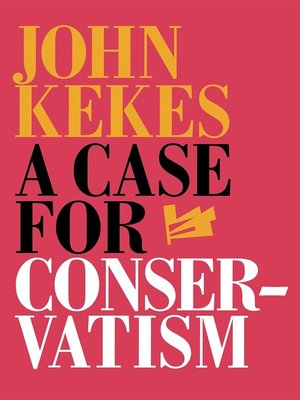
Sign up to save your library
With an OverDrive account, you can save your favorite libraries for at-a-glance information about availability. Find out more about OverDrive accounts.
Find this title in Libby, the library reading app by OverDrive.



Search for a digital library with this title
Title found at these libraries:
| Loading... |
In his recent book Against Liberalism, philosopher John Kekes argued that liberalism as a political system is doomed to failure by its internal inconsistencies. In this companion volume, he makes a compelling case for conservatism as the best alternative. His is the first systematic description and defense of the basic assumptions underlying conservative thought.Conservatism, Kekes maintains, is concerned with the political arrangements that enable members of a society to live good lives. These political arrangements are based on skepticism about ideologies, pluralism about values, traditionalism about institutions, and pessimism about human perfectibility. The political morality of conservatism requires the protection of universal conditions of all good lives, social conditions that vary with societies, and individual conditions that reflect differences in character and circumstance. Good lives, according to Kekes, depend equally on pursuing possibilities that these conditions establish and on setting limits to their violations.Attempts to make political arrangements reflect these basic tenets of conservatism are unavoidably imperfect. Kekes concludes, however, that they represent a better hope for the future than any other possibility.
|In his recent book Against Liberalism, philosopher John Kekes argued that liberalism as a political system is doomed to failure by its internal inconsistencies. In this companion volume, he makes a compelling case for conservatism as the best alternative. His is the first systematic description and defense of the basic assumptions underlying conservative thought.
Conservatism, Kekes maintains, is concerned with the political arrangements that enable members of a society to live good lives. These political arrangements are based on skepticism about ideologies, pluralism about values, traditionalism about institutions, and pessimism about human perfectibility.
The political morality of conservatism requires the protection of universal conditions of all good lives, social conditions that vary with societies, and individual conditions that reflect differences in character and circumstance. Good lives, according to Kekes, depend equally on pursuing possibilities that these conditions establish and on setting limits to their violations.
Attempts to make political arrangements reflect these basic tenets of conservatism are unavoidably imperfect. Kekes concludes, however, that they represent a better hope for the future than any other possibility.






